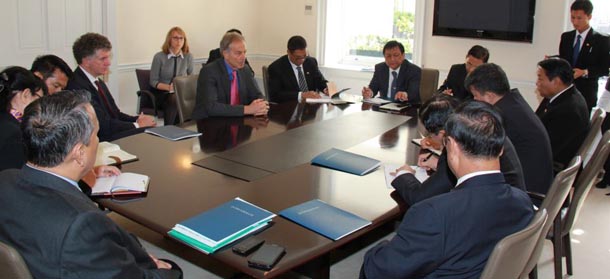The Burmese government’s top peace negotiator for ethnic conflicts is touring the United Kingdom this week to discuss his country’s peacemaking efforts with former British Prime Minister Tony Blair, Foreign Secretary William Hague and other UK officials.
President’s Office Minister Aung Min, who leads the Burmese government’s efforts to negotiate ceasefires and peace deals with armed ethnic rebel groups, arrived in London on Tuesday at the invitation of the UK government, according to a statement by the UK Foreign and Commonwealth Office. He was joined by Burma’s Immigration Minister Khin Yi and a delegation from the Myanmar Peace Center.
The bilateral talks focused on efforts to secure peace in Burma’s resource-rich ethnic minority states, where armed rebel groups have fought for decades in pursuit of greater political autonomy, and to curb a recent wave of anti-Muslim riots in central Burma.
Officials discussed how British experts could best support further progress in Burma, according to the statement on Tuesday.
“We agreed on the need to take forward negotiations to achieve a permanent ceasefire in Kachin State, and to address the hostility behind the recent outbreak of anti-Muslim violence in Meiktila,” Hague said in the statement, referring to a town in central Burma’s Mandalay Division where anti-Muslim riots began last month, killing at least 43 people and leaving thousands displaced. “The British Government will continue to support work bringing different faith communities in Burma together.”
Officials also discussed strategies to improve conditions in Arakan State, west Burma, where more than 120,000 people were displaced in communal violence between Buddhists and Muslims last year.
“We discussed the serious humanitarian situation in Rakhine [Arakan] State and the importance of ensuring that the Rohingya [Muslim] community, which has lived in Burma for many centuries, is accorded full citizenship rights in line with international standards,” the British foreign minister said in the statement.
Hague commended Aung Min for his role in promoting change in the Southeast Asian country, which has signed ceasefires with 10 of 11 major armed ethnic minority groups since a nominally civilian government came to power two years ago.
“It was a pleasure to welcome His Excellency Aung Min to the United Kingdom, and to congratulate him on his role in the remarkable changes we have seen in Burma,” he said.
“Last week G8 [Group of Eight] foreign ministers endorsed the Burmese Government’s commitment to responsible investment, and today I made clear that the British Government will continue to do all it can to encourage Burma’s transition to a free and prosperous society.”
During the visit, Aung Min told the London-based BBC that he and his peace delegation would hold peace talks with the Kachin Independence Army (KIA), one of the country’s strongest armed ethnic groups, in the Kachin State capital of Myitkyina after returning from Europe.
He told the news agency that gunfire had ceased in Burma’s northernmost state and that he hoped the upcoming meeting with Kachin rebel leaders would be successful.
Representatives from the European Union, the United Nations and the United States could attend the upcoming meetings as international observers, he added, but they would have no right to participate in the discussions.
Aung Min and the Myanmar Peace Center delegation, including Hla Maung Shwe and Dr. Kyaw Yin Hlaing, also visited Ireland on Thursday to learn about the peace process there.
Next week Aung Min will travel to the United States to meet with members of the Burmese community and accept a peace prize from the International Crisis Group on behalf of Burma’s President Thein Sein.

















